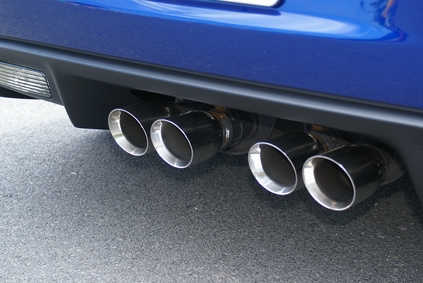
The exhaust system of your car has a significant effect on its horsepower and fuel economy. Clogged muffler pipes or exhaust system damage can create back pressure that can inhibit the flow of air to your engine. Routine maintenance to your vehicle's exhaust system can prevent damage, but if there are any problems, basic repairs to your muffler can increase exhaust system capability, improve fuel emissions and the sounds emitted by the tailpipe.
Unclog the tubing of the exhaust system. An air compressor can unclog a system and clear it of any debris. Check the muffler for dents.
Modify your exhaust system by replacing the stock system with an aftermarket kit. Unscrew the bolts that hold the muffler in place. Replace the stock muffler system it with a high-performance aftermarket brand for more pressurized airflow to the engine, more power and improved performance. Stock mufflers are manufactured to absorb sound. They track exhaust through a number of departments within the muffler to stifle the volume. High-performance mufflers are modified to increase the horsepower of the car's engine.
Repair the tip of the exhaust pipe. Purchase an aftermarket muffler exhaust tip that can improve exhaust system emissions filtering capabilities and increase fuel economy. Many stock mufflers don't come equipped with a specialize muffler tip. This is an added modification that will enhance the system's performance.
Buy an exhaust system repair kit to resolve any complications you might be having with the vehicle's muffler. Most auto parts stores sell kits designed to repair tailpipes, crossover pipes, manifolds and catalytic converters.